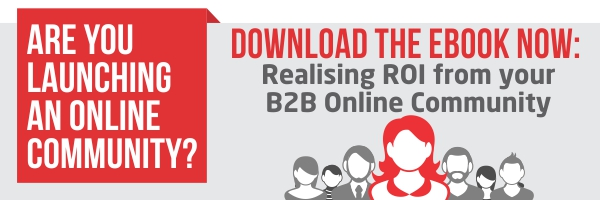
More and more event business leaders are finally getting serious about online communities for their events - after all it works right (I'd be out of a job otherwise!) and to stay in the game they're wising up to the fact that it's not the future anymore. It's now!
Event leaders are asking meaningful questions, wanting to know what it takes to make it happen and what they need to do to get started.
Very recently I had a consulting session around the subject with a business leader and I had to seriously demystify some misconceptions he had heavily ingrained in his head. So I wanted to share these misconceptions as I am finding that many event business leaders are having similar thoughts around online communities.
Here's a list of the 8 most common online event community misconceptions:
Misconception 1: "My existing team can take on the extra work and write the content."
After working with many organisations and helping launch many successful communities, it is very likely that your current team does not have the skillset required. You might have a great event content producer but unfortunately most lack the marketing knowledge to make that content sticky and found by search engines. You might have a great digital marketer but they might lack writing and copywriting skills. So more often than not you will need to hire/contract a specific person or two with specific skillset.
Misconception 2: "I will be able to monetise my online community through sponsors."
Everyone seems to think that once you embark on building a community, your sponsors will be queuing up to pay loads of money to be privy of the conversations that take place. The reality is that while most of them will always say yes to a hypothetical scenario, you will soon realise that you will really need the numbers (traffic) and engagement levels to merit some investment. Even after you are able to secure investment, your sponsors interest is to hijack the conversations with a specific agenda in mind! Sales.
Misconception 3: "My online community will be self sustaining."
It is likely that most of the conversations taking place will be one-directional and most people will come to your website purely to consume content and information. Online communities need to be nurtured and stimulated with a lot of content. This content at the very beginning will not be provided by the users themselves, fact.
Misconception 4: "We don’t need to create content ourselves, we’ll repurpose it from others"
Generating content is not about, repurposing (copying and pasting) existing content on your website from other sources. By other sources I mean, thought leading publications, media partners, sponsors, exhibitors. While in practice that is possible, Google doesn't really go for that and your SEO could be greatly affected.

Misconception 5: "Building communities is about content! It does not require an indepth strategy."
Launching a community or a series of communities requires a defined business strategy, with key milestones and targets to achieve (mostly non financial at the start). It is not about writing articles, blogs and premium content, it is about creating the right content that will trigger the response required. You have a business serving events to various verticals, each vertical will need to be treated separately.
Misconception 6: "Online communities need to be gated."
Online communities are not about creating a simplified version of "LinkedIn" for your business, that you control in its entirety to simply sell value to your sponsors. In fact most successful online communities begin open to start with and only after a while a gate can be built around some of your content.
Misconception 7: "Online communities will help me sell a lot of tickets."
The truth is that it won’t, no it will not sell a lot of tickets to your events, yes you will sell tickets immediate result and it will not replace your traditional channels for marketing your event. Online communities exist to add value to its members, to enhance the event experience and conversations. The immediate benefit you will receive is in the shape of credibility, traffic to your website, respect from search engines and enhance your brand. Therefore it will make you stand out from the crowd and from the other 100 competitors running events in the same topics you do. It will facilitate the indirect selling of tickets at some point in the future. But be real, some of your community members you will realise will not and will never attend your events, and some of your event attendees will never participate in your community. It is a fact of marketing.
Misconception 8: "There are tools out there that can do all the work for me."
You can have the best tool or engine in the world but the engine needs the fuel required to operate at its best. Signing up to HubSpot, Pardot, Eloqua, Marketo or Salesforce or many of the tools will enable your marketing automation it is not going to make your online community a success. In some cases it might make the lives of your marketing team hell.
There you have it, hopefully that helps clarify some of the assumptions easily made about online communities.
Here are some thoughts that will help you establish how and what will be the best approach for your own business or event:
- Do you really know why you need an online community?
- Begin by understanding where you are generating most of your income currently. I mean which of your verticals or events is more successful?
- Focus on your hottest vertical (if you operate across various industries)
- Learn who is visiting your website and what they are doing in it. I mean you need to know your basic marketing numbers.
- If you mostly market your events via email, you need to start expanding the channels you use. Social media is crucial. This will help you and your team to understand how to build momentum
- Begin a pilot project or a proof of concept project before you make big investment decisions
- Highjack other communities before you embark on launching yours - start posting on the Linkedin blogging tool, participate in active groups and track traffic/engagement. This will give you a flavour of how much effort is needed in creating consistent content.
- Assess your current practices and your existing team. There will be gaps and you'll need to fill them to mitigate any potential risk
In conclusion
Launching a community requires serious commitment of time and resources and patience! It doesn't yield results in the short term, so if you think that your online community is going to be the immediate source of hundreds of event registrations, then unfortunately you're mistaken.
The most successful online communities to date, are in it for the long run. Being consistent and building momentum.







Do you have any comments?